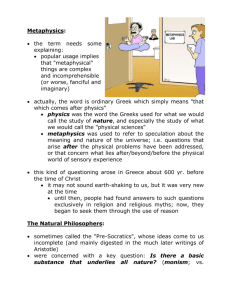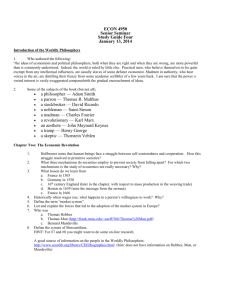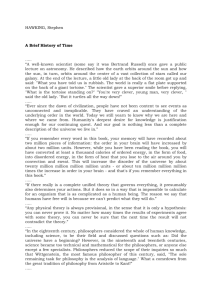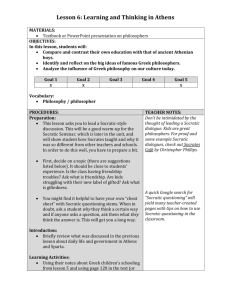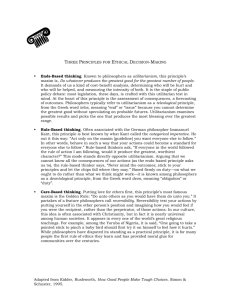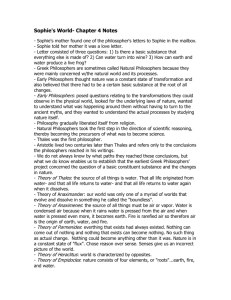Picture - Society for Philosophical Inquiry
advertisement
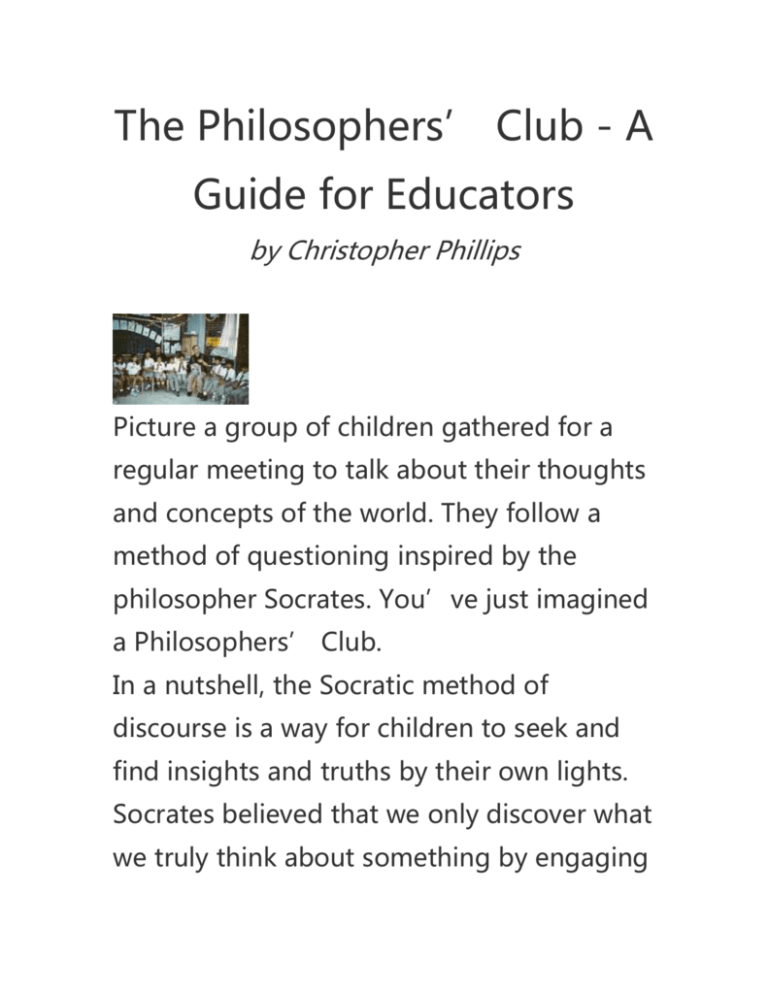
The Philosophers’ Club - A Guide for Educators by Christopher Phillips Picture a group of children gathered for a regular meeting to talk about their thoughts and concepts of the world. They follow a method of questioning inspired by the philosopher Socrates. You’ve just imagined a Philosophers’ Club. In a nutshell, the Socratic method of discourse is a way for children to seek and find insights and truths by their own lights. Socrates believed that we only discover what we truly think about something by engaging in constructive and empathetic discourse with others. Philosophers’ Clubs invariably help members nurture their ability in “the fourth R”—the ability to reason—in breathtakingly imaginative and constructive ways. As a result, children are more highly motivated to develop their abilities in the traditional three Rs. In this form of creative and critical inquiry, children are required to back up their viewpoints with compelling evidence presented in well-structured arguments. Sloppy or lazy thinking is taboo. So every step of the way, the teacher or volunteer educator is helping a child develop reasoning and logical thinking skills. What's more, Philosophers' Clubs will enable members to ponder in a meaningful way those three questions of questions: Who am I? What am I capable of? Who can I become? As children develop clear and more thoughtful answers to these questions, they become better able throughout their lives to chart courses for realizing their loftier hopes and dreams. Getting Started It's best to have at least three members and to limit the club to about thirty members. This ensures that each child has a chance to have his or her say. Meetings should last from thirty minutes to one hour, ideally at least once a week. While you may choose to start with the first chapter of the book, any chapter will do. For the purposes of this guide, the “Why Are We Here?" section is the working example. It would be a good idea to write all the various responses on a chalkboard or large piece of poster paper, so the children can read and reflect on them all in more depth. Questions, Questions, Questions It might take at least two or three meetings to complete each section of the book and the accompanying “Questions, Questions, Questions” before moving on to another chapter. And because these clubs are established to empower children to become expert questioners, it’s critical for the adult educator not to be overly directive. Let the children themselves propose the questions. Have each member take turns raising something that they’re the most curious about on that day. The Socratic Method Exploring Concepts and Assumptions One of the key maxims in philosophical inquiry the Philosophers’ Club way is this: The unexamined concept is not worth using. In our sample question “Why are we here?” there lie some hidden concepts:What is why? What is we? What is here? And even, What is are? If you say we “are,” you are assuming we “exist.”Someone needs to explain what it means to exist. By isolating each concept, members can probe them individually. Later in the discourse, the facilitator will bring the concepts back together. You can follow up with questions like “Where else are we?” And you might get responses like “We’re here in these chairs, in this neighborhood, in this city, state, country, continent, planet, galaxy, universe.” Then you might ask: What do all these places have in common? Why are we in these places? How do we know we’re in these places? You ask questions like this not because you think you know all the possible answers, but because you think you don’t know. Those with a Socratic sensibility hope that other members may provide previously unfamiliar answers and broaden members’ perspectives. Our sample question “Why are we here?” also contains assumptions that need to be challenged and examined. The word why assumes that there is a reason we’re here. So you will want to explore: What is a reason? What are different types of reasons? What makes a reason a good reason for explaining why we are here? Is there such a thing as here? What is it and how do we determine where it is? The word we suggests that there are many I’s discussing the question, and that these I’s exist, and that we can call all of these I’s “we.” Which may lead members to ask: How do we know “I” when we see it? Or is “I” something we don’t see, but detect by other means? Is “I” even a substance—an it—or is it something else altogether? The sample question also assumes there is such a thing as “here” and that it can be located. So you could ask: Is it always possible to locate ourselves in a “here” and determine where we are? If so, how precisely do we go about doing this? Can we do it on our own or do we always need the help of others? Or is it that only others can determine where we are?



